
Anders M Fjell
@andersfjell.bsky.social
Professor of psychology. Center for Lifespan Changes in Brain and Cognition. University of Oslo. Interested in the brain from the start to the end. www.lcbc.uio.no
Reposted by Anders M Fjell
Over 12,500 brain scans from cognitively healthy adults reveal that sex differences in age-related brain atrophy can’t explain why women have higher rates of Alzheimer's disease. The authors call for research into alternative explanations. In PNAS: https://ow.ly/hIYj50XgiCn

October 22, 2025 at 5:01 PM
Over 12,500 brain scans from cognitively healthy adults reveal that sex differences in age-related brain atrophy can’t explain why women have higher rates of Alzheimer's disease. The authors call for research into alternative explanations. In PNAS: https://ow.ly/hIYj50XgiCn
It is this type of sky over the university. Morning office window view.

October 20, 2025 at 6:11 AM
It is this type of sky over the university. Morning office window view.
@nature.com made a news piece on our new @pnas.org paper. Good job Anne Ravndal!
Men’s brains shrink faster than women’s: what that means for Alzheimer’s.
www.nature.com/articles/d41...
Men’s brains shrink faster than women’s: what that means for Alzheimer’s.
www.nature.com/articles/d41...

October 14, 2025 at 6:25 AM
@nature.com made a news piece on our new @pnas.org paper. Good job Anne Ravndal!
Men’s brains shrink faster than women’s: what that means for Alzheimer’s.
www.nature.com/articles/d41...
Men’s brains shrink faster than women’s: what that means for Alzheimer’s.
www.nature.com/articles/d41...
Reposted by Anders M Fjell
Another interesting paper from LifeBrain consortium suggesting that sex differences in healthy brain aging are unlikely to explain higher prevalence of Alzheimer’s disease in women www.pnas.org/doi/10.1073/...

Sex differences in healthy brain aging are unlikely to explain higher Alzheimer’s disease prevalence in women | PNAS
As Alzheimer’s disease (AD) is diagnosed more frequently in women, understanding the
role of sex has become a key priority in AD research. However,...
www.pnas.org
October 14, 2025 at 3:20 AM
Another interesting paper from LifeBrain consortium suggesting that sex differences in healthy brain aging are unlikely to explain higher prevalence of Alzheimer’s disease in women www.pnas.org/doi/10.1073/...
@pnas.org: Small sex differences in brain aging, steeper decline in men in some regions. Does not explain why more women are diagnosed with AD. 12,638 longitudinal MRIs, 4,726 participants across 14 cohorts. Control for head-size, education, life-expectancy. www.pnas.org/doi/10.1073/...

Sex differences in healthy brain aging are unlikely to explain higher Alzheimer’s disease prevalence in women | PNAS
As Alzheimer’s disease (AD) is diagnosed more frequently in women, understanding the
role of sex has become a key priority in AD research. However,...
www.pnas.org
October 14, 2025 at 6:05 AM
@pnas.org: Small sex differences in brain aging, steeper decline in men in some regions. Does not explain why more women are diagnosed with AD. 12,638 longitudinal MRIs, 4,726 participants across 14 cohorts. Control for head-size, education, life-expectancy. www.pnas.org/doi/10.1073/...
Using 4570 longitudinal MRIs + 1684 Aβ PET scans from cognitively healthy older adults @jamesmroe.bsky.social find cortical thickness changed ≥7 years before PET-detectable Aβ. Those who later developed high Aβ already had thicker cortex & less thinning.
@LCBC_uio www.biorxiv.org/content/10.1...
@LCBC_uio www.biorxiv.org/content/10.1...

Cortical thickness changes precede high levels of amyloid by at least seven years
Alzheimer's disease (AD) is now defined based on its underlying brain pathology, with the presence of amyloid (Aβ) plaques at high enough levels sufficient to warrant a diagnosis in the absence of cog...
www.biorxiv.org
August 21, 2025 at 7:43 AM
Using 4570 longitudinal MRIs + 1684 Aβ PET scans from cognitively healthy older adults @jamesmroe.bsky.social find cortical thickness changed ≥7 years before PET-detectable Aβ. Those who later developed high Aβ already had thicker cortex & less thinning.
@LCBC_uio www.biorxiv.org/content/10.1...
@LCBC_uio www.biorxiv.org/content/10.1...
Reposted by Anders M Fjell
🧠 Education boosts memory levels but not brain aging resistance
A new study across 33 countries found more education links to better memory and larger brain volume, but not slower cognitive or brain decline.
🔗 www.nature.com/articles/s41...
#SciComm 🧪
A new study across 33 countries found more education links to better memory and larger brain volume, but not slower cognitive or brain decline.
🔗 www.nature.com/articles/s41...
#SciComm 🧪

Reevaluating the role of education on cognitive decline and brain aging in longitudinal cohorts across 33 Western countries - Nature Medicine
In a large cross-national study, education was linked to better memory and larger brain volumes but not to slower cognitive or brain decline with age, suggesting that the association reflects early-li...
www.nature.com
August 12, 2025 at 7:04 AM
🧠 Education boosts memory levels but not brain aging resistance
A new study across 33 countries found more education links to better memory and larger brain volume, but not slower cognitive or brain decline.
🔗 www.nature.com/articles/s41...
#SciComm 🧪
A new study across 33 countries found more education links to better memory and larger brain volume, but not slower cognitive or brain decline.
🔗 www.nature.com/articles/s41...
#SciComm 🧪
@natmed.nature.com made a nice Research Briefing about our paper. Highglights with less details, the main conclusion is the same: Education does not affect memory decline or brain aging @LCBC_UiO @LifebrainEU www.nature.com/articles/s41...
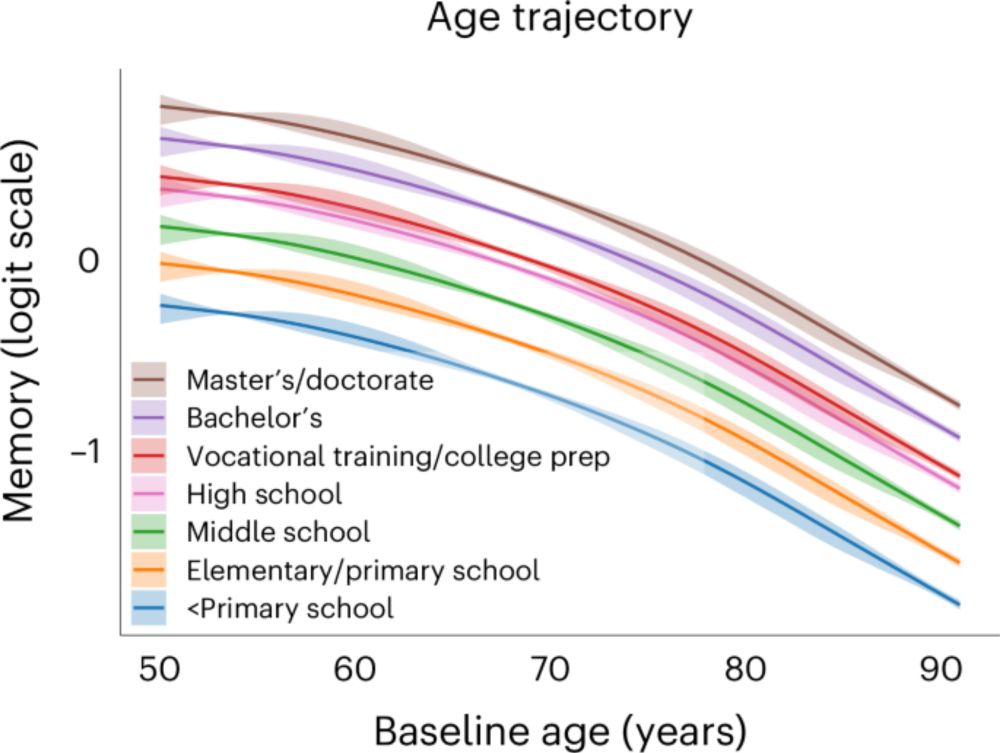
Education does not affect memory decline or brain aging - Nature Medicine
Competing explanations account for education’s link to better memory and brain structure in older age. By analyzing more than 400,000 memory scores and over 15,000 MRI scans, we found the association ...
www.nature.com
August 6, 2025 at 7:36 AM
@natmed.nature.com made a nice Research Briefing about our paper. Highglights with less details, the main conclusion is the same: Education does not affect memory decline or brain aging @LCBC_UiO @LifebrainEU www.nature.com/articles/s41...
Reposted by Anders M Fjell
🧠💡 CAN YOU SAVE YOUR FUTURE BRAIN BY GETTING A DEGREE? A new Nature Medicine paper—led by @andersfjell.bsky.social—analyzed 407,000 memory tests and 15,000 brain scans across 33 countries to find out whether education protect you from cognitive decline at older ages. The answer: not really. [1/5]
August 4, 2025 at 8:33 PM
🧠💡 CAN YOU SAVE YOUR FUTURE BRAIN BY GETTING A DEGREE? A new Nature Medicine paper—led by @andersfjell.bsky.social—analyzed 407,000 memory tests and 15,000 brain scans across 33 countries to find out whether education protect you from cognitive decline at older ages. The answer: not really. [1/5]
New in @NatureMedicine Education is not linked to slower memory or brain decline in aging. We analyzed 400,000 memory tests and 15,000 MRIs from 33 countries. Associations likely shaped by childhood schooling and development. @LCBC_UiO @LifebrainEU rdcu.be/ex8iC
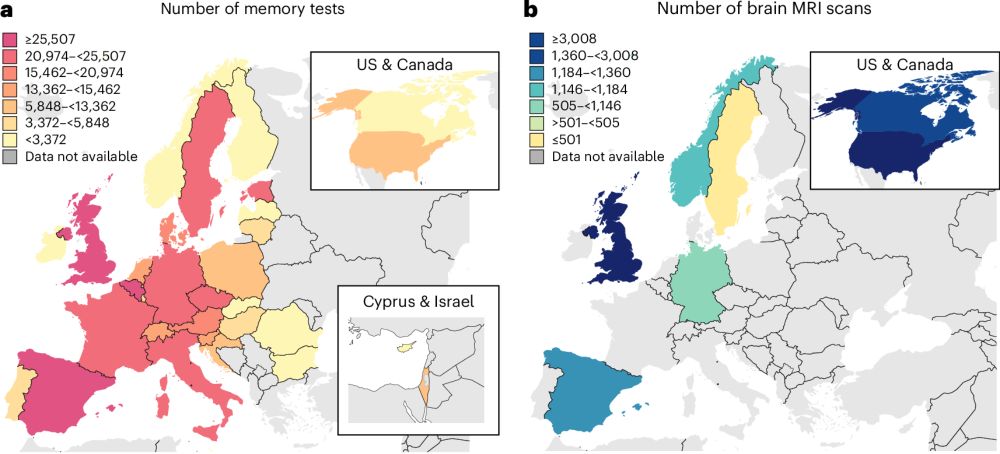
Reevaluating the role of education on cognitive decline and brain aging in longitudinal cohorts across 33 Western countries
Nature Medicine - In a large cross-national study, education was linked to better memory and larger brain volumes but not to slower cognitive or brain decline with age, suggesting that the...
rdcu.be
August 1, 2025 at 11:39 AM
New in @NatureMedicine Education is not linked to slower memory or brain decline in aging. We analyzed 400,000 memory tests and 15,000 MRIs from 33 countries. Associations likely shaped by childhood schooling and development. @LCBC_UiO @LifebrainEU rdcu.be/ex8iC
Reposted by Anders M Fjell
New paper by @njudd.com shows that an additional year of education doesn't causally affect telomere length in old age, despite many (theory) accounts arguing otherwise. It's been desk rejected by 13 journals happy to publish small 'positive' telomere studies. Sigh. www.biorxiv.org/content/10.1...
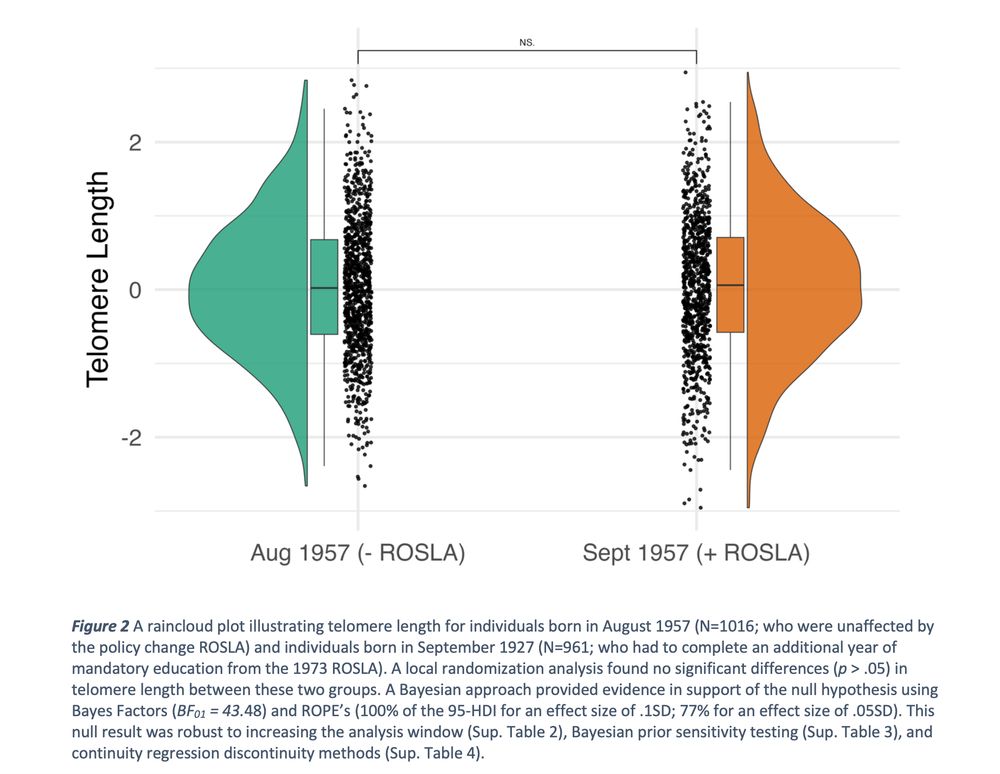
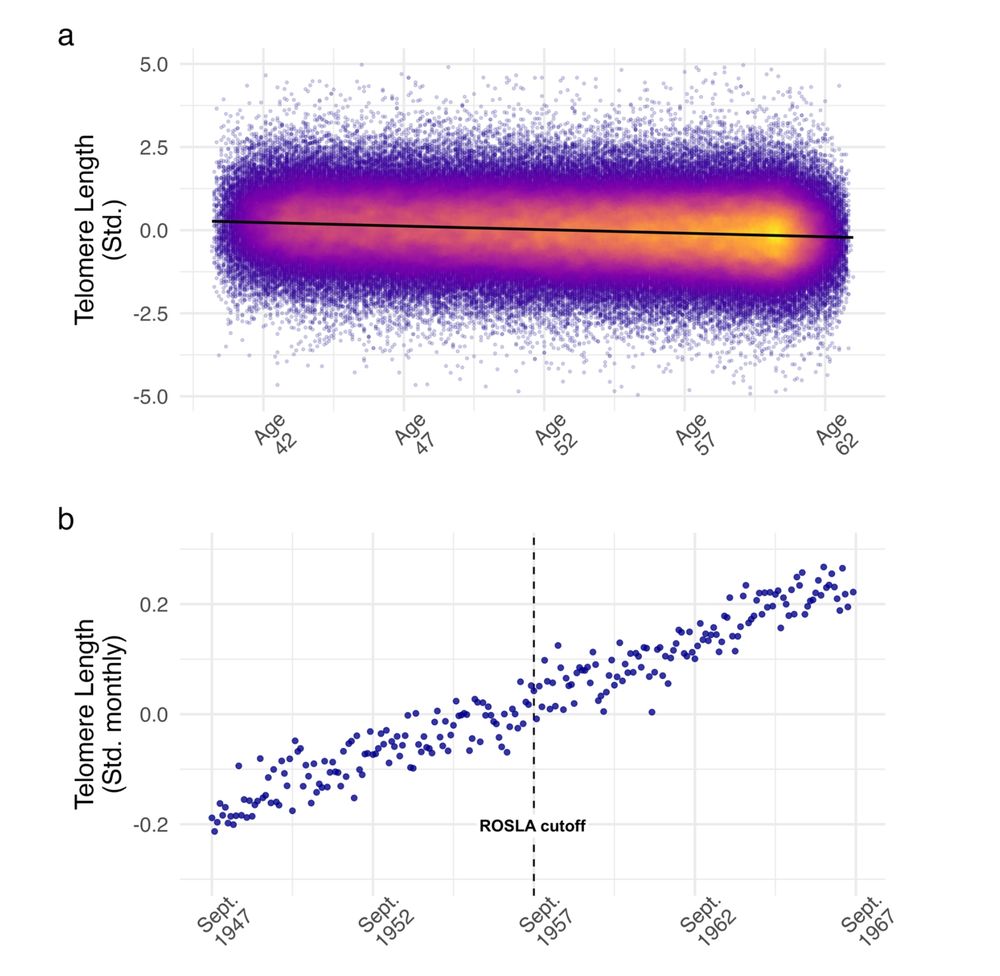
June 30, 2025 at 5:35 PM
New paper by @njudd.com shows that an additional year of education doesn't causally affect telomere length in old age, despite many (theory) accounts arguing otherwise. It's been desk rejected by 13 journals happy to publish small 'positive' telomere studies. Sigh. www.biorxiv.org/content/10.1...
This is a really interesting paper - showing what you can and cannot infer about individual differences in change from x-sect data. A take-home-message is that typical brain age models cannot be used to measure differences in brain aging - deviations reflect stable differences between people.
Happy to see my first first-author paper in Imaging Neuroscience (along with @fmrib-karla.bsky.social and @nichols.bsky.social):
Characterising ongoing brain aging and baseline effects from cross-sectional data
doi.org/10.1162/IMAG...
Characterising ongoing brain aging and baseline effects from cross-sectional data
doi.org/10.1162/IMAG...
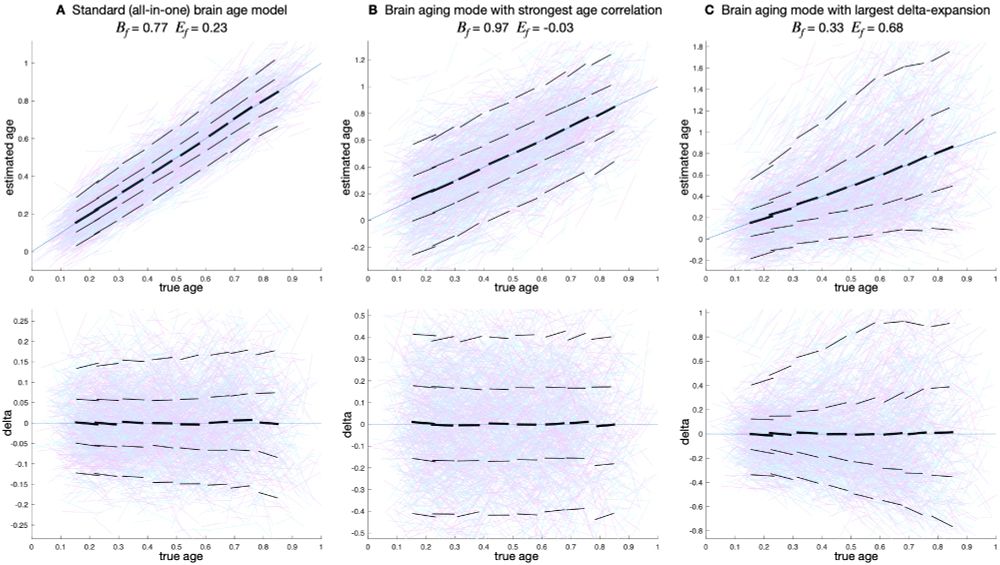
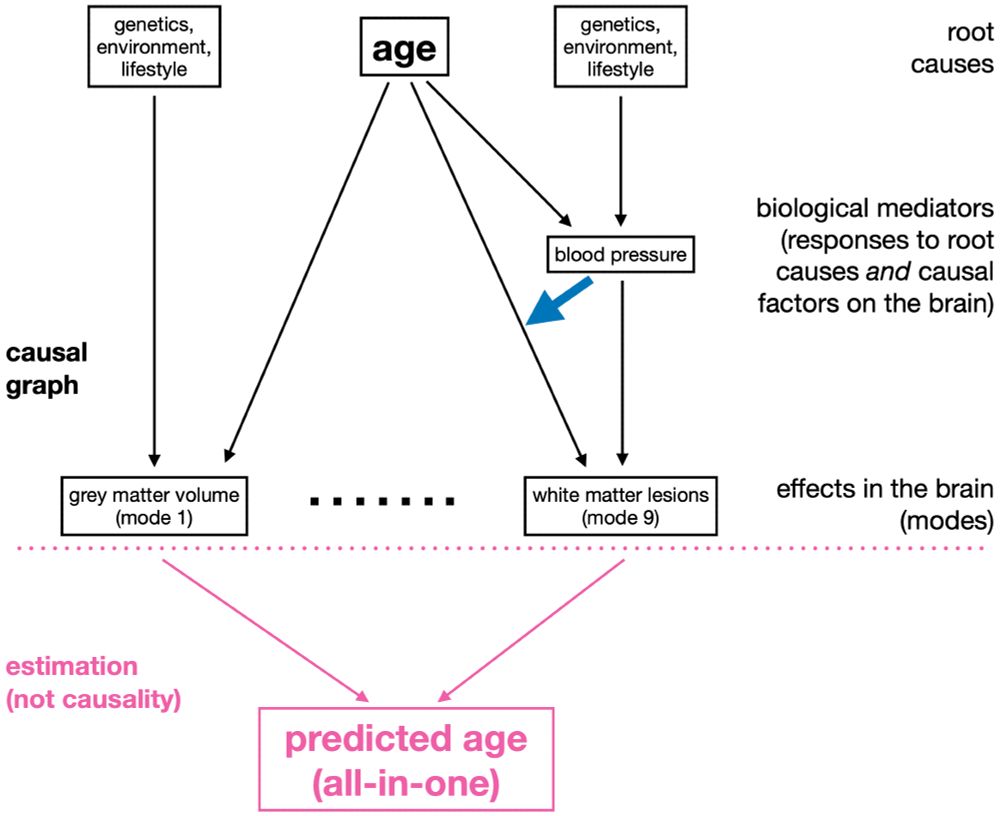
May 30, 2025 at 9:04 AM
This is a really interesting paper - showing what you can and cannot infer about individual differences in change from x-sect data. A take-home-message is that typical brain age models cannot be used to measure differences in brain aging - deviations reflect stable differences between people.
Preprint: before age 60, between-people diffs in brain vols almost exclusively reflect stable diffs, while systematic diffs in rate-of-change in aging cause up to 40% of the variation to be due to change at 80 years. @edvardg.bsky.social 🧵https://www.biorxiv.org/content/10.1101/2025.05.26.655710v1

May 30, 2025 at 8:54 AM
Preprint: before age 60, between-people diffs in brain vols almost exclusively reflect stable diffs, while systematic diffs in rate-of-change in aging cause up to 40% of the variation to be due to change at 80 years. @edvardg.bsky.social 🧵https://www.biorxiv.org/content/10.1101/2025.05.26.655710v1
Very nice in @pnas.org - people who slept closer to their own culture's norms for sleep duration had better overall health. Sleep duration is more complex than often considered in a strict neuroscientific or biomedical sense. @ChristineOuBC @stevenheine.bsky.social www.pnas.org/doi/10.1073/...
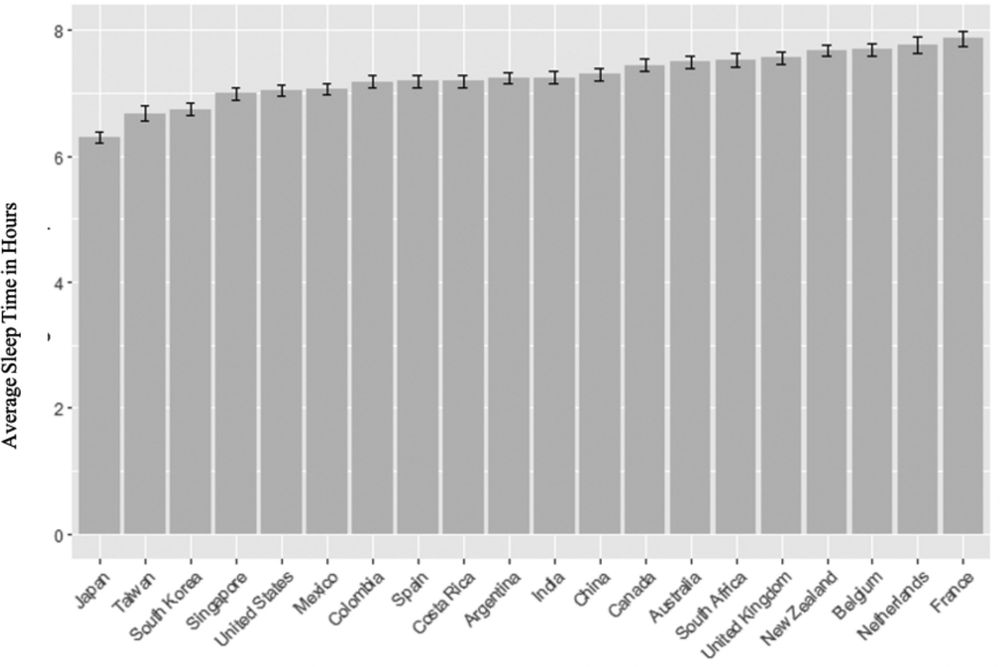
Healthy sleep durations appear to vary across cultures | PNAS
Past research finds that sleep duration is reliably linked with health yet sleep durations
differ substantially between countries. We investigated ...
www.pnas.org
May 13, 2025 at 8:15 AM
Very nice in @pnas.org - people who slept closer to their own culture's norms for sleep duration had better overall health. Sleep duration is more complex than often considered in a strict neuroscientific or biomedical sense. @ChristineOuBC @stevenheine.bsky.social www.pnas.org/doi/10.1073/...
This is a great centre (and a great city), very good opportunity 👇
Join us in beautiful Oslo!
Associate Professor @ocbe.bsky.social
@uio.no
Deadline May 18th
www.jobbnorge.no/en/available...
Associate Professor @ocbe.bsky.social
@uio.no
Deadline May 18th
www.jobbnorge.no/en/available...

Associate Professor at the Oslo Centre for Biostatistics and Epidemiology (276924) | University of Oslo
Job title: Associate Professor at the Oslo Centre for Biostatistics and Epidemiology (276924), Employer: University of Oslo, Deadline: Sunday, May 18, 2025
www.jobbnorge.no
May 9, 2025 at 6:29 AM
This is a great centre (and a great city), very good opportunity 👇
A balanced discussion in @nature on the possible role of sleep for waste clearance, with both sides presenting their arguments. What is lacking is a stronger focus on how the evidence looks in humans - so far it is not particularly strong. www.nature.com/articles/d41...

The great brain clearance and dementia debate
An established theory for how good sleep reduces a person’s risk of neurodegenerative disease has been called into question. The ensuing argument could have enormous consequences for the treatment of ...
www.nature.com
May 5, 2025 at 9:31 PM
A balanced discussion in @nature on the possible role of sleep for waste clearance, with both sides presenting their arguments. What is lacking is a stronger focus on how the evidence looks in humans - so far it is not particularly strong. www.nature.com/articles/d41...
Very interesting from @VidalDidac - MUCH higher reliability for structural neuroimaging measures with longer follow-up time rather than more follow-ups or higher n. 2.-year follow-up requires 4 times higher n than 6-year follow up. @LCBC_UiO direct.mit.edu/imag/article...

Reliability of structural brain change in cognitively healthy adult samples
Abstract. In neuroimaging research, tracking individuals over time is key to understanding the interplay between brain changes and genetic, environmental, or cognitive factors across the lifespan. Yet...
direct.mit.edu
April 30, 2025 at 6:35 AM
Very interesting from @VidalDidac - MUCH higher reliability for structural neuroimaging measures with longer follow-up time rather than more follow-ups or higher n. 2.-year follow-up requires 4 times higher n than 6-year follow up. @LCBC_UiO direct.mit.edu/imag/article...
Did you know that different prenatal environment causes MZ twins' brains to deviate? But when exposed to cognitive intervention in adulthood, common genetics make their brains converge while DZ twin brains become more different. Fascinating! @LCBC_UiO www.biorxiv.org/content/10.1...

April 15, 2025 at 7:20 PM
Did you know that different prenatal environment causes MZ twins' brains to deviate? But when exposed to cognitive intervention in adulthood, common genetics make their brains converge while DZ twin brains become more different. Fascinating! @LCBC_UiO www.biorxiv.org/content/10.1...
Preprint from @didacvp.bsky.social - a common brain factor underlying memory decline in older age. Stronger associations in older, but independent of genetic Alzheimer risk. Very interesting work using >10.000 MRI scan. @LCBC_UiO www.biorxiv.org/content/10.1...

March 31, 2025 at 12:28 PM
Preprint from @didacvp.bsky.social - a common brain factor underlying memory decline in older age. Stronger associations in older, but independent of genetic Alzheimer risk. Very interesting work using >10.000 MRI scan. @LCBC_UiO www.biorxiv.org/content/10.1...
Reposted by Anders M Fjell
Open Postdoctoral position! - ERC Advanced Grant project HOMME
www.jobbnorge.no/en/available-jobs/job/276000/postdoctoral-fellow
About the HOMME project www.sv.uio.no/psi/english/research/projects/homme
www.jobbnorge.no/en/available-jobs/job/276000/postdoctoral-fellow
About the HOMME project www.sv.uio.no/psi/english/research/projects/homme

Postdoctoral Fellow (276000) | University of Oslo
Job title: Postdoctoral Fellow (276000), Employer: University of Oslo, Deadline: Friday, April 25, 2025
www.jobbnorge.no
March 27, 2025 at 2:10 PM
Open Postdoctoral position! - ERC Advanced Grant project HOMME
www.jobbnorge.no/en/available-jobs/job/276000/postdoctoral-fellow
About the HOMME project www.sv.uio.no/psi/english/research/projects/homme
www.jobbnorge.no/en/available-jobs/job/276000/postdoctoral-fellow
About the HOMME project www.sv.uio.no/psi/english/research/projects/homme
We find hippocampal correlates of superior episodic memory are the same across adulthood - we don't find evidence that special hippocampal features are important in aging across memory activity, macrostructure, microstructure and atrophy. rdcu.be/edvSC
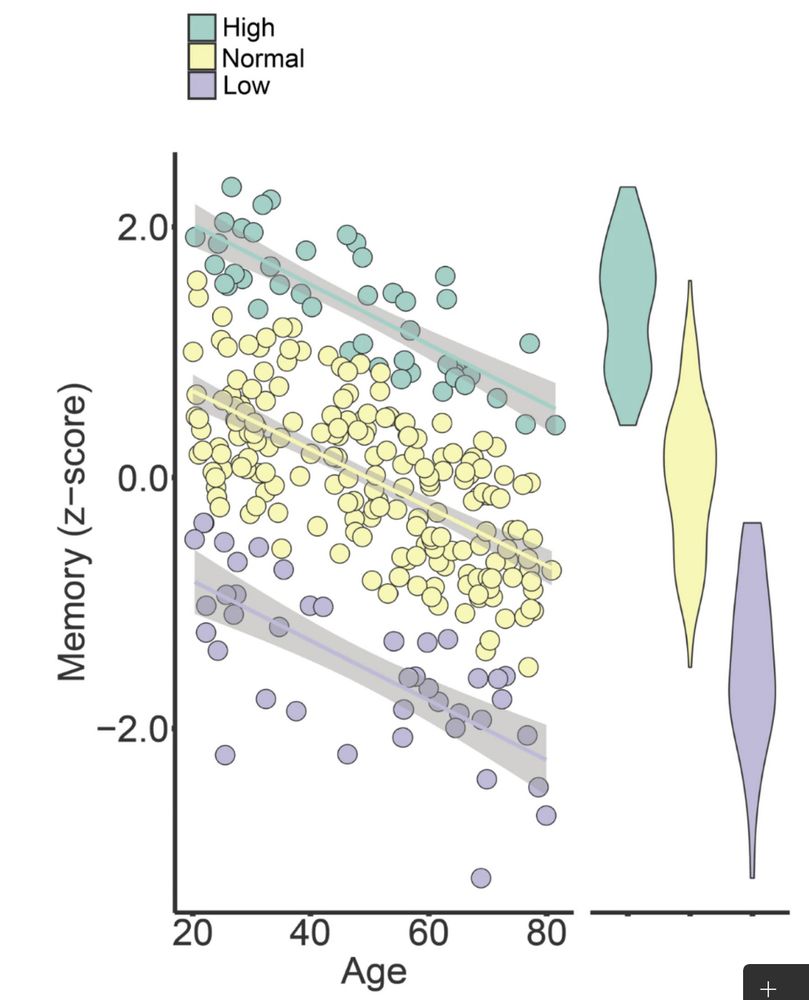
March 17, 2025 at 7:46 AM
We find hippocampal correlates of superior episodic memory are the same across adulthood - we don't find evidence that special hippocampal features are important in aging across memory activity, macrostructure, microstructure and atrophy. rdcu.be/edvSC
This is the coolest preprint I have been a (small) part of: twins cybercycling in virtual reality to demonstrate how early and later environmental influences on the cortex can be distinguished and modified. www.biorxiv.org/content/10.1...

March 10, 2025 at 1:09 PM
This is the coolest preprint I have been a (small) part of: twins cybercycling in virtual reality to demonstrate how early and later environmental influences on the cortex can be distinguished and modified. www.biorxiv.org/content/10.1...
This is the coolest preprint I have been a (small) part of: twins cybercycling in virtual reality to demonstrate how early and later environmental influences on the cortex can be distinguished and modified. www.biorxiv.org/content/10.1...

March 10, 2025 at 12:02 PM
This is the coolest preprint I have been a (small) part of: twins cybercycling in virtual reality to demonstrate how early and later environmental influences on the cortex can be distinguished and modified. www.biorxiv.org/content/10.1...
Really interesting from @maxwellelliott.bsky.social et al: 1-year brain changes reliably detected by cluster-scanning - burst of multiple, very short T1's. Great potential for tracking individual differences in brain change over clinically meaningful intervals. www.medrxiv.org/content/10.1...

February 26, 2025 at 7:40 AM
Really interesting from @maxwellelliott.bsky.social et al: 1-year brain changes reliably detected by cluster-scanning - burst of multiple, very short T1's. Great potential for tracking individual differences in brain change over clinically meaningful intervals. www.medrxiv.org/content/10.1...
New paper: neural segregation in development & dedifferentiation in aging associate with memory. Within & between-network FC during encoding and retrieval, 2 samples, 7-82 years, n=734, using a multiverse approach. Lead by Håkon Grydeland 👏 @LCBC_UiO www.sciencedirect.com/science/arti...

Network segregation during episodic memory shows age-invariant relations with memory performance from 7 to 82 years
Lower episodic memory capability, as seen in development and aging compared with younger adulthood, may partly depend on lower brain network segregati…
www.sciencedirect.com
February 25, 2025 at 7:21 AM
New paper: neural segregation in development & dedifferentiation in aging associate with memory. Within & between-network FC during encoding and retrieval, 2 samples, 7-82 years, n=734, using a multiverse approach. Lead by Håkon Grydeland 👏 @LCBC_UiO www.sciencedirect.com/science/arti...

